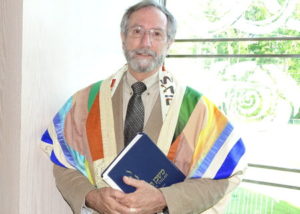
By Rabbi Jack Luxemburg
“What you get by achieving your goals is less important than what you become by achieving your goals.”
This insight attributed to Johann Wolfgang von Goethe is the essential problem that the story of Pinchas presents: How are we to understand the act of vigilante violence perpetrated by Pinchas at the end of last week’s parshah and the apparent reward Pinchas receives at the start of this week’s parshah?
After killing two individuals in his righteous anger, Pinchas is given God’s “birchat Shalom” (blessing of peace) and the status of a kohen (priest) (Numbers 25:6-10). Are we to conclude from this that Torah condones vigilante justice?
It should be no surprise that a rabbinic tradition that is loath to have a duly constituted court take even one life in 70 years (Mishna Makkot) would be troubled by the story of Pinchas. In the Jerusalem Talmud (San. 9:7), it is suggested that the Elders of Israel sought to excommunicate Pinchas for his actions. Why? Because they could not be sure that Pinchas did not act for some selfish reason while claiming that he acted in the name of God. They recognized that Pinchas, and those who might emulate his actions, were a true danger. Only the intervention of a bat kol (heavenly voice), testifying to Pinchas’ righteousness allayed their concern.
Another sign of rabbinic discomfort with Pinchas is found in the midrash (Shemot Rabbah 33:5). Here Pinchas is portrayed as acting out of concern for the whole Israelite community suffering under a plague as punishment for the dalliance with the Moabite women and their pagan god, Pe’or. While trying to justify his actions, this midrash is also a warning. It underscores that only God can “act zealously” on God’s behalf. To justify violence by claiming that one is “acting zealously” on God’s behalf is a claim the rabbis do not allow to stand — not for Pinchas nor for anyone else.
Given their discomfort, how do our sages explain the rewards that Pinchas seems to receive? Perhaps, they are not rewards as we would normally understand. One source (BT, Zevachim 101b) suggests that Pinchas’ actions resulted in ei-shalom (the absence of peace) and Pinchas was bound to work to restore peace among the tribes of Israel. Only then could he, himself, know any peace.
But why the priesthood? Interestingly, there is less commentary on this, but maybe one reason is that the priesthood was not a reward, but a constraint.
Our sages wrestle with the story of Pinchas because they are troubled by its suggestion that the ends justify the means. They know that our tradition is more inclined to teach that the means should ennoble the ends. And they question whether Pinchas’ actions rise to that standard. They seemed equally concerned with the point made by Goethe — how we go about accomplishing our goals strongly influences who we become in the process.
Rabbi Jack Luxemburg is rabbi emeritus of Temple Beth Ami.





